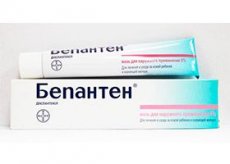Medical expert of the article
New publications
Preparations
Bepanthen
Last reviewed: 03.07.2025

All iLive content is medically reviewed or fact checked to ensure as much factual accuracy as possible.
We have strict sourcing guidelines and only link to reputable media sites, academic research institutions and, whenever possible, medically peer reviewed studies. Note that the numbers in parentheses ([1], [2], etc.) are clickable links to these studies.
If you feel that any of our content is inaccurate, out-of-date, or otherwise questionable, please select it and press Ctrl + Enter.

Bepanthen is a remedy that helps heal various wounds.
Indications Bepanthena
The cream is used in the following cases:
- for application to reddened dry areas of the skin (or to small cracks in the skin) as a preventive method;
- to accelerate the time of epithelialization and scarring of the skin in case of minor injuries (abrasions or mild burns), as well as skin irritations (for example, as a result of UV irradiation or after photo- or radiotherapy procedures) and diaper dermatitis. It is also used for bedsores and chronic skin ulcers, cervical erosions, anal fissures and after skin transplantation;
- treatment of the skin during local application of corticosteroids (or after the procedure);
- as a preventative measure in the process of caring for female mammary glands (during lactation) or for the treatment of cracked nipples and irritation in this area.
Release form
Released in the form of cream in tubes of 30 or 100 g. Inside a separate package there is 1 tube of cream.
Bepanten Plus is a dermatological drug from the category of disinfectants and antiseptics.
Pharmacodynamics
Dexpanthenol is the active component of the cream. Inside the cells, it quickly transforms into calcium pantothenate and acts on the body as a vitamin. Dexpanthenol after local application is more easily absorbed into the skin than calcium pantothenate.
Calcium pantothenate is a component of essential coenzyme A (CoA). As acetyl coenzyme A, it is a key participant in metabolic processes within all cells. This component therefore becomes a necessary part of the regeneration and healing processes of damaged mucous membranes and skin.
Pharmacokinetics
Dexpanthenol is absorbed through the skin quite quickly, and then immediately converted into calcium pantothenate and incorporated into the structure of the endogenous depot of this vitamin.
Calcium pantothenate is synthesized with plasma protein (mainly albumins with β-globulins). The substance level in a healthy adult is approximately 500-1000 μg/l in the blood, as well as 100 μg/l in the serum.
The substance is not metabolized and is excreted unchanged. When taken orally, the component is excreted in urine by 60-70%, and the remainder is excreted in feces. In an adult, 2-7 mg of the drug is excreted in urine per day, and in a child - 2-3 mg.
Dosing and administration
To speed up the processes of regeneration and epithelialization, it is necessary to apply the cream to the damaged area of the skin once or several times a day (depending on the need).
When caring for the mammary glands of nursing mothers, the cream is applied to the nipples after each feeding procedure.
When treating defects on the mucous membrane of the cervix, it is necessary to use the cream under the supervision of the attending physician - apply once or several times a day.
When treating diaper dermatitis in infants, the cream is applied after each diaper change.
Bepanten is quickly absorbed into the skin, which is why it can be used to treat weeping wounds, applied to the scalp, and face. The cream is easily distributed over the entire surface of the skin, which allows it to be used to eliminate painful mild burns (for example, sunburn).
 [ 1 ]
[ 1 ]
Use Bepanthena during pregnancy
There is no information about the risk of complications as a result of using Bepanten cream during pregnancy or lactation. Pregnant women should use the cream with the permission of a doctor.
When treating cracked nipples during lactation, it is necessary to wash off the cream before the feeding procedure.
Contraindications
Contraindications include intolerance to dexpanthenol or other components of the drug.
Side effects Bepanthena
The use of the cream may cause adverse reactions from the immune system, as well as the subcutaneous layer with the skin. There is information about the development of allergy manifestations on the skin: allergic or contact dermatitis, eczema with erythema, urticaria and the appearance of irritation, rash or blisters on the skin.
Storage conditions
The cream should be kept in a place inaccessible to small children. Temperature conditions – no more than 25°C.
 [ 2 ]
[ 2 ]
Shelf life
Bepanten can be used for a period of 3 years from the date of release of the medicinal cream.
Attention!
To simplify the perception of information, this instruction for use of the drug "Bepanthen" translated and presented in a special form on the basis of the official instructions for medical use of the drug. Before use read the annotation that came directly to medicines.
Description provided for informational purposes and is not a guide to self-healing. The need for this drug, the purpose of the treatment regimen, methods and dose of the drug is determined solely by the attending physician. Self-medication is dangerous for your health.

